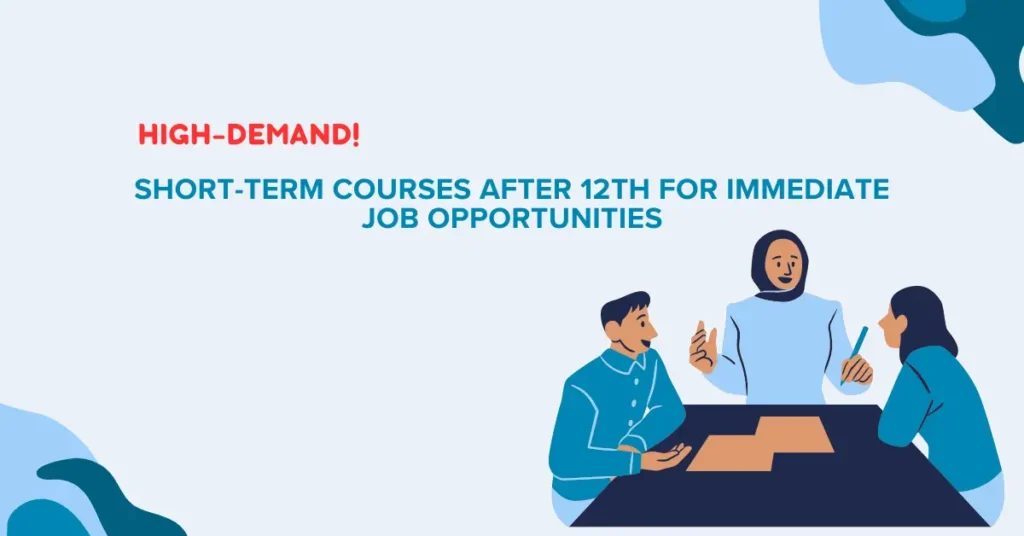For students completing their 12th grade, opting for short-term courses offers a strategic advantage by enhancing job readiness and opening doors to immediate employment opportunities. These courses are designed to equip students with practical, job-specific skills in a relatively short period, making them highly sought-after by employers.
Importance of Pursuing Short-Term Courses After 12th Grade
Choosing to pursue short-term courses after 12th grade is a proactive step towards gaining a competitive edge in the job market. Unlike traditional degree programs that span several years, these courses focus on imparting specialized skills quickly and efficiently. This not only accelerates the learning process but also ensures that graduates are well-prepared to meet industry demands upon completion.
Benefits of Short-Term Courses
One of the primary benefits of short-term courses is their ability to facilitate quick skill acquisition. Whether in fields like digital marketing, graphic design, web development, data science, or cybersecurity, these courses provide hands-on training that prepares students for immediate job roles. Moreover, they are cost-effective compared to longer academic programs, making quality education accessible to a broader range of students.
Increasing Demand for Job-Specific Skills
In today’s competitive job market, employers increasingly prioritize candidates with specialized skills relevant to their industries. Short-term courses offer targeted training that aligns with current industry trends and requirements, making graduates more attractive to prospective employers. As industries continue to evolve with technological advancements, the demand for professionals skilled in areas like digital marketing, web development, and data analytics continues to grow.
By opting for high-demand short-term courses after 12th grade, students not only enhance their employability but also position themselves for rewarding careers in dynamic industries. These courses serve as stepping stones towards achieving professional success and seizing immediate job opportunities in today’s competitive landscape.
7 best Short Term courses
1. Digital Marketing
Digital marketing encompasses a broad spectrum of online strategies aimed at reaching and engaging with target audiences effectively. As businesses increasingly rely on digital channels to promote their products and services, the demand for skilled digital marketers continues to grow. Understanding SEO (Search Engine Optimization), SEM (Search Engine Marketing), social media marketing, content marketing, email marketing, and analytics are core components of this course.
Key Skills Acquired:
Students will gain proficiency in optimizing websites for search engines, managing paid advertising campaigns, creating compelling content for social media platforms, designing effective email marketing campaigns, and analyzing digital marketing metrics to drive business growth.
Course Duration:
Typically spanning 3 to 6 months, these courses provide a comprehensive yet condensed curriculum designed to equip students with practical skills that are immediately applicable in the job market.
Recommended Institutions:
Leading platforms such as Google Digital Garage, Coursera, Udemy, and Simplilearn offer reputable digital marketing courses. These institutions provide a blend of theoretical knowledge and hands-on experience through interactive modules and practical assignments.
Job Opportunities:
Graduates of digital marketing courses can pursue various career paths including digital marketer, SEO specialist, social media manager, and content strategist. These roles are in high demand across industries ranging from e-commerce and digital agencies to corporate marketing departments.
Career Prospects and Salary:
Entry-level salaries for digital marketers typically range from INR 2.5 lakhs to 5 lakhs per annum, depending on the employer and location. With experience and specialization, professionals in senior roles can command salaries between INR 8 lakhs to 15 lakhs per annum, reflecting the value placed on digital expertise in today’s competitive market.
Digital marketing courses not only prepare students for immediate job opportunities but also provide a pathway to continuous learning and career advancement in the dynamic digital landscape.
2. Graphic Designing
Graphic design is crucial for businesses looking to establish a strong visual identity and communicate effectively with their audience. From creating logos and advertisements to designing websites and mobile apps, graphic designers are essential in shaping brand perception and user experience.
Key Skills Acquired
Participants in graphic design courses learn a range of essential skills including Adobe Photoshop for image editing, Adobe Illustrator for vector graphics, Adobe InDesign for layout design, typography principles, branding strategies, and effective visual communication techniques.
Course Duration
Typically lasting between 3 to 6 months, these courses provide intensive training in both fundamental principles and advanced techniques of graphic design.
Recommended Institutions
Aspiring graphic designers can enroll in courses offered by reputable platforms such as Udemy, Coursera, Skillshare, and Adobe Creative Cloud Tutorials. These platforms offer a combination of video lectures, hands-on projects, and mentorship from industry experts.
Job Opportunities
Graduates of graphic design courses can explore diverse career paths including roles as graphic designers, visual designers, branding specialists, and UI/UX designers. These positions are in high demand across sectors such as advertising, marketing, media, and technology.
Career Prospects and Salary
Entry-level salaries for graphic designers typically range from INR 2 lakhs to 4 lakhs per annum in India. With experience and a strong portfolio, professionals can earn between INR 6 lakhs to 12 lakhs per annum, depending on their skills, expertise, and the industry they work in.
Investing in a graphic design course after 12th grade can pave the way for a rewarding career with ample opportunities for growth and creativity in the dynamic field of visual communication.
3. Web Development
A typical web development course spans 3 to 6 months and covers a comprehensive range of skills crucial for building websites. Participants delve into HTML and CSS for structuring and styling web pages, and JavaScript for interactive elements, and learn about front-end frameworks like React and Angular. Back-end development skills are also honed, focusing on server-side programming and database management. Understanding responsive design ensures that websites function seamlessly across devices, catering to the diverse needs of today’s users.
Key Skills Acquired
Participants emerge from the course proficient in:
- HTML and CSS for structuring and styling web pages.
- JavaScript for implementing interactive features.
- Front-end frameworks such as React and Angular for efficient development.
- Back-end development skills including server-side scripting and database management.
- Responsive design techniques to ensure optimal performance across devices.
Course Duration and Institutions
Enrollments are available at prominent online platforms and institutions like Codecademy, Coursera, Udemy, and freeCodeCamp. These platforms offer flexible learning schedules and a comprehensive curriculum designed to equip learners with industry-relevant skills.
Job Opportunities
Upon completing the course, graduates can explore diverse roles such as:
- Front-end Developer: Focuses on client-side development, ensuring user interface functionality and aesthetics.
- Back-end Developer: Manages server-side logic and database operations, ensuring seamless integration of front-end and back-end components.
- Full-stack Developer: Proficient in both front-end and back-end development, capable of handling entire web projects independently.
- Web Designer: Specializes in the visual aspects of website creation, including layout design and user experience optimization.
Career Prospects and Salary
Entry-level salaries for web developers typically range from INR 3 lakhs to 5 lakhs per annum. With experience and expertise in specialized areas such as full-stack development or niche technologies, professionals can command higher salaries ranging from INR 8 lakhs to 15 lakhs per annum. The dynamic nature of web development ensures continuous learning and career growth opportunities in an evolving digital landscape.
4. Data Science
Data Science and Analytics is about using data to help businesses make smart decisions and understand important information. Students learn programming languages like Python and R, essential for data manipulation and analysis. They also learn how to make data easy to understand with visuals, use machine learning tools, analyze data with statistics, and manage data well.
Key Skills Acquired
Upon completing the course, students are proficient in:
- Python and R programming languages
- Data visualization tools and techniques
- Machine learning algorithms and techniques
- Statistical analysis and hypothesis testing
- Data cleaning, manipulation, and preprocessing
Course Duration
Typically spanning 3 to 6 months, these courses are intensive and designed to impart practical skills aligned with industry standards.
Recommended Institutions
Leading platforms such as Coursera, Udemy, edX, and DataCamp offer comprehensive Data Science and Analytics courses. These platforms provide flexibility with self-paced learning and certifications recognized by industry leaders.
Job Opportunities
Graduates can pursue various roles, including:
- Data Analyst
- Data Scientist
- Business Analyst
- Machine Learning Engineer
Career Prospects and Salary
Entry-level salaries for Data Analysts and similar roles range from INR 4 lakhs to 6 lakhs per annum. With experience and specialization, professionals in senior roles like Data Scientists can earn between INR 10 lakhs to 20 lakhs per annum. The field has great job opportunities because more and more industries are using data to make decisions.
Data Science and Analytics courses provide a solid foundation for those seeking immediate employment in a dynamic and high-demand field. As businesses continue to prioritize data-driven strategies, professionals equipped with these skills are in high demand, ensuring a rewarding and promising career path for aspirants.
5. Cyber Security
A course in Cyber Security focuses on preparing individuals to protect digital systems and networks from cyberattacks and unauthorized access. Students learn about ethical hacking, network security protocols, information security best practices, and risk management strategies. The duration of such courses typically ranges from 3 to 6 months, offering intensive training in the fundamentals of cybersecurity.
Key Skills Acquired:
Participants acquire skills in ethical hacking techniques, understanding network vulnerabilities, implementing information security measures, and managing risks associated with data breaches. These skills are essential for securing sensitive information and ensuring the integrity of digital assets.
Recommended Institutions:
Some recommended platforms and institutions offering cybersecurity courses include Coursera, Udemy, Cybrary, and Simplilearn. These platforms provide comprehensive training modules designed by industry experts, covering both theoretical knowledge and practical applications in cybersecurity.
Job Opportunities:
Graduates of Cyber Security courses can explore diverse career paths, including roles such as cybersecurity analyst, ethical hacker, information security manager, and network security engineer. These roles are integral to safeguarding organizations’ data and infrastructure from cyber threats.
Career Prospects and Salary:
Entry-level salaries for cybersecurity professionals typically range from INR 3 lakhs to 5 lakhs per annum in India. With experience and specialization, professionals can command higher salaries ranging between INR 8 lakhs to 18 lakhs per annum, depending on their expertise and the organization’s scale.
6. Content Writing
Content writing courses typically span 1-3 months and are offered by renowned platforms like Udemy, Coursera, HubSpot Academy, and Skillshare. These courses equip students with essential skills such as copywriting, SEO writing, blogging, technical writing, and storytelling. The flexibility to create content in multiple languages, with English being the preferred choice for higher-paying opportunities, enhances job prospects significantly.
Key Skills Acquired
- Copywriting: Master the art of persuasive writing to engage and convert readers.
- SEO Writing: Learn to optimize content for search engines, improving visibility and ranking.
- Blogging: Develop skills in creating engaging and informative blog posts to attract and retain an audience.
- Technical Writing: Acquire proficiency in translating complex information into clear, user-friendly documentation.
- Storytelling: Hone the ability to craft narratives that resonate with readers, enhancing brand storytelling and content marketing efforts.
Course Institutions and Options
- Udemy: Offers a variety of content writing courses tailored to different skill levels and interests.
- Coursera: Provides courses from leading universities and companies worldwide, ensuring a comprehensive learning experience.
- HubSpot Academy: Focuses on inbound marketing and content creation, aligning skills with industry best practices.
- Skillshare: Provides a platform for creative professionals to learn and collaborate, offering diverse content writing courses.
Career Opportunities and Advantages
Professionals with content writing skills are highly sought after across industries:
- Freelance Opportunities: Work independently and remotely, catering to global clients.
- Corporate Roles: Join marketing teams as a content specialist, contributing to brand growth and digital strategies.
- E-commerce and Digital Marketing: Drive traffic and engagement through effective content creation and distribution.
Language Considerations
While proficiency in multiple languages enhances marketability, proficiency in English opens doors to higher-paying opportunities globally. English remains the lingua franca of international business, making it a strategic choice for aspiring content writers aiming to maximize earning potential.
7. Hotel Management
In today’s competitive job market, acquiring specialized skills through short-term courses has become increasingly crucial for students aiming to kickstart their careers right after 12th grade. One such promising field is Hospitality and Tourism Management, offering lucrative job opportunities and career growth prospects. Let’s delve into what this course entails and how it can pave the way for a successful career in the hospitality industry.
Hospitality and Tourism Management courses are designed to equip students with the essential skills required to excel in various roles within the hospitality sector. These courses typically span a duration of 3 to 6 months, providing intensive training in customer service, hotel management, tourism planning, and event management. Whether you aspire to manage hotels, plan and execute memorable events, or promote tourism destinations, this course covers all facets essential for thriving in the hospitality industry.
Institutions Offering the Course
Aspiring students can pursue Hospitality and Tourism Management courses from reputable online platforms such as Udemy and Coursera, which offer flexible learning schedules and industry-relevant curriculum. Additionally, local hospitality management schools provide hands-on training and internships, allowing students to gain practical experience and network with industry professionals.
Skills Gained
Upon completion of the course, students acquire a diverse set of skills essential for excelling in hospitality and tourism roles:
- Customer Service: Learning effective communication and interpersonal skills to ensure exceptional guest experiences.
- Hotel Management: Understanding the operations and management of hotels, including front office, housekeeping, and food and beverage management.
- Tourism Planning: Developing strategies to promote tourism destinations, plan tours, and manage travel operations.
- Event Management: Mastering the art of organizing and executing events, from conferences to weddings, focusing on logistics, budgeting, and guest coordination.
Career Opportunities
The hospitality and tourism industry offers a wide range of career opportunities for graduates of Hospitality and Tourism Management courses:
- Hotel Manager: Overseeing day-to-day operations, ensuring guest satisfaction, and managing staff.
- Event Planner: Organizing and coordinating events, from corporate meetings to large-scale celebrations.
- Tourism Officer: Promoting tourist destinations, creating travel packages, and managing tour operations.
- Restaurant Manager: Running the operations of dining establishments, ensuring high-quality service and profitability.
- Cruise Ship Director: Managing onboard activities, entertainment, and guest services on cruise ships.
Career Prospects and Salary
Graduates of Hospitality and Tourism Management courses can expect promising career prospects and competitive salaries. Entry-level positions such as Hotel Management Trainees or Event Coordinators typically offer salaries ranging from INR 2.5 lakhs to 5 lakhs per annum. With experience and specialization, professionals can advance to managerial roles earning between INR 6 lakhs to 12 lakhs per annum or more, depending on the organization and location.
For Such more blogs visit- Rapid Samachar



